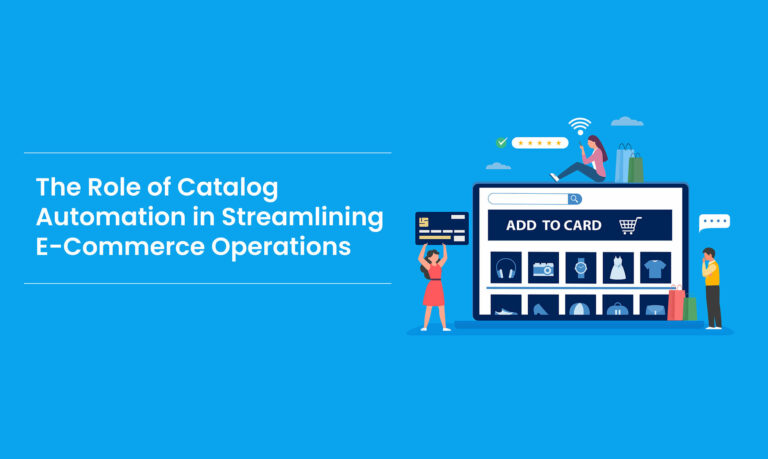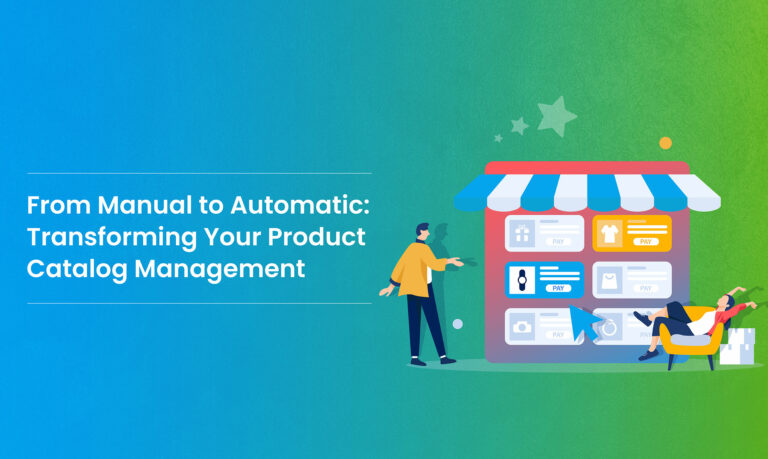Are you a retail entrepreneur who has a shop and an online website? Despite having these business channels, do you need help attracting potential customers to your business? The e-commerce market is booming, estimated at USD 8.80 trillion in 2024, with projections indicating it will reach USD 18.81 trillion by 2029. Customers always expect a quick and outstanding shopping experience in such a fast-growing industry.
One effective strategy you may still need to explore is implementing product catalog management. Product catalog management brings a range of benefits to the table for eCommerce businesses.
To delve deeper into the advantages of catalog automation for businesses, check out this detailed blog. Understand these benefits and formulate a potent eCommerce strategy that drives growth and attracts more customers to your retail business.
What Is Product Catalog Management?
Catalog automation is a process for modern e-commerce sales and distribution companies, especially given the high volume of products and intense competition, particularly in the B2B sector.
Maintaining order throughout the entire chain of receipt, creation, cataloging, and distribution of product content is critical for ensuring a positive shopping experience. It leads to increased traffic and better sales conversion rates. The visible aspects of a great shopping experience begin with the invisible work behind the scenes.
For an ideal product catalog, you first need the right service catalog software. Catalog automation involves using software tools that automate tasks that were previously done manually. Many companies still struggle with manual processes due to complex organizational structures and systems.
Tasks such as collecting SKUs for new seasonal products, updating logos for each brand, preparing images for Amazon product descriptions, and adjusting catalog prices for specific markets require precision. Without catalog management software, these tasks are prone to errors and delays.
Product catalog management is crucial for the continuous growth of online sales and the evolving shopping habits of customers, who now prefer the convenience of online shopping for various products.
The importance of effective catalog management is evident in industries such as apparel, makeup, and home furnishings, where customers require detailed information about size, color, fit, and material before making a purchase decision.
Ensuring that customers have access to comprehensive product details is essential for instilling confidence in their purchase choices. Poor catalog management, characterized by inaccurate or insufficient product information, can lead to reduced sales as customers may hesitate to buy. Moreover, inaccuracies can contribute to a higher volume of product returns, impacting overall customer satisfaction.
An efficiently managed catalog enhances the customer shopping experience and streamlines the process of updating product information on your online store.
For example, if a consumer is looking for an oven in a certain color, make sure to present all the color possibilities available. With appropriate catalog management, the process of adding new items with full information becomes much more efficient.
Finally, if your online companies provide B2B e-commerce services, a precise and streamlined product catalog will assist in attracting the correct suppliers and merchants.
Why Catalog Automation Is Crucial for Your eCommerce Business?
Managing a complex product catalog manually can become a significant challenge for rapidly growing businesses. Implementing automation in certain aspects of this process can allow you to focus on sustaining your business’s growth.
Time Efficiency:
Imagine spending thirty minutes inputting product details for just one item. It’s not an efficient use of your valuable time, is it? Manually managing product catalogs can consume entire days. Besides the tedium of data entry, there are also constant updates and corrections required for product information. Automating tasks like image editing, data sourcing, and image recognition can save time and enable you to focus on strategic initiatives.
Faster Time-to-Market
Catalog automation enables businesses to bring new products to market faster by streamlining the product information management process. The agility gives businesses a competitive edge and allows them to capitalize on market trends and opportunities more effectively.
Cost Savings:
Reducing the time spent on manual data management directly translates into cost savings. Manual catalog management demands more resources, leading to increased operational expenses. Automation becomes imperative if you aim to cut down on operational costs effectively.
Centralized repository
Managing numerous product catalogs across various channels, such as customers, subscribers, and affiliates, poses a significant challenge.
As time passes, the management of different catalogs becomes complex due to new product releases and the requirement for bundled services across multiple departments. The catalog management system allows for the efficient management of product data with minimal redundancy.
Catalog management software gathers enterprise data into a centralized repository, granting brands comprehensive access and visibility through a single browser interface.
Accuracy and Consistency:
Automation in creating product information and images helps minimize inaccuracies and typos that can confuse customers and impact conversion rates. It also ensures consistency in your brand’s voice across all product and category pages, enhancing the overall customer experience.
Scalability:
As your product range expands, manual catalog management can become a hindrance to business growth. Adopting eCommerce catalog automation is essential for increasing efficiency and ensuring scalability without compromising quality.
Personalized Customer Experience:
When your product information is regularly updated, error-free, and aligned with consistent branding, it leads to satisfied customers. eCommerce catalog automation improves the customer experience and drives higher conversions.
Compliance and Governance:
Automated catalog management systems can enforce compliance with industry regulations and internal governance policies. It ensures product information is accurate and up-to-date, meets legal requirements, and reduces the non-compliance risks and associated penalties.
Competitive Advantage
Businesses that use catalog automation can provide more individualized product offers, quicker time-to-market, and better customer experiences, giving them a competitive edge. It helps to attract and retain customers in a crowded and competitive marketplace.
How to Optimize Your Product Catalog for Better Performance?
A well-maintained product catalog is crucial for the success of any eCommerce business. Here are some simple tips to ensure your product catalog is optimized for maximum effectiveness:
Centralization:
Keep all your product information in a centralized repository that is accessible to all teams. It gives consistency and accuracy across different channels and platforms.
Streamlined Workflows:
Set clear roles and responsibilities for managing and updating product information. It reduces errors and ensures efficient collaboration among teams.
Continuous Enrichment:
Regularly update and enrich your product data to provide customers with detailed and accurate information. It enhances the shopping experience and reduces return rates.
Design Quality:
Focus on creating a well-designed catalog with consistent imagery and layout. Use master pages, image editing techniques, automatic page numbering, and guide tools to organize content effectively.
Standardization:
Ensure consistency and uniformity across all versions of your product catalog. It includes standardizing data formats, attributes, and information across different sales channels.
Syndication:
Syndicate your product catalog across multiple sales channels to reach a wider audience. It involves keeping product information consistent and up-to-date across all platforms.
Conclusion
Catalog automation facilitates the effective and efficient presentation of accurate product information. When executed with precision, it delivers innovative advantages for your business. Businesses can leverage automation technologies to streamline catalog management processes, gain valuable insights, and stay ahead of the competition in a fast-paced digital economy.


